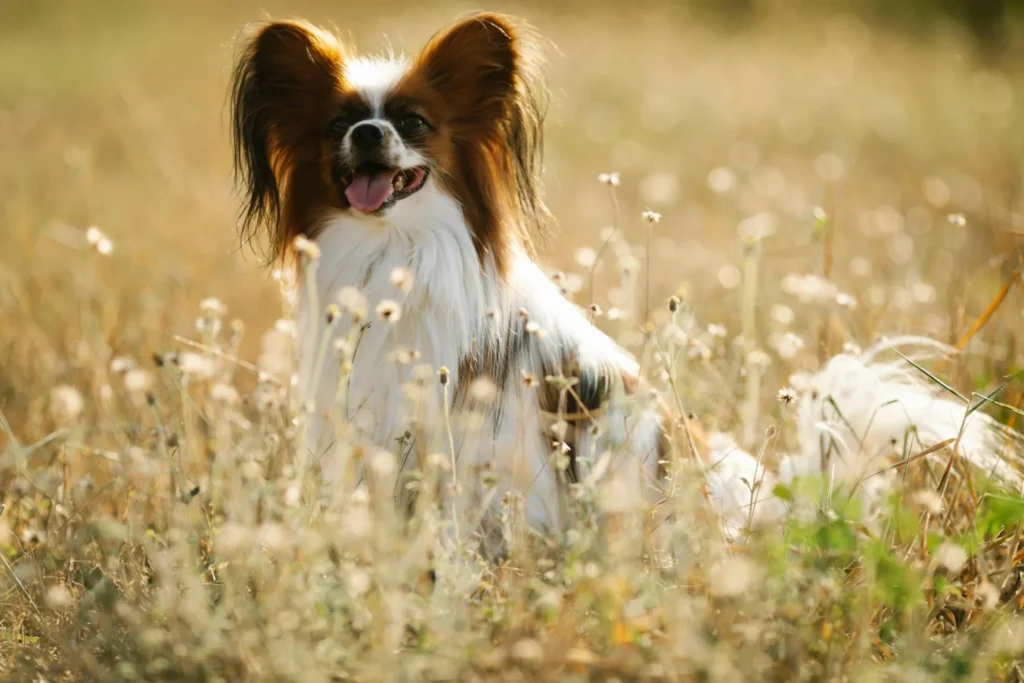Introduction: The Curious Case of the Howling Poodle 🤔
When we think of howling dogs, our minds often conjure images of wolves or huskies serenading the moon. But what about the elegant, intelligent poodle? Do poodles howl? In this comprehensive guide, we’ll explore the fascinating world of poodle vocalization, focusing on their ability to howl and what it means for poodle owners and enthusiasts.
Understanding Poodle Vocalization: The Basics 🗣️
Before we dive into the specifics of howling, let’s first understand the range of vocalizations poodles are capable of:
- Barking 🐶
- Whining 😢
- Growling 😠
- Yipping 🐕
- Howling 🐺

Each of these sounds serves a different purpose in canine communication.
The Poodle’s Vocal Anatomy: Built for Sound 🦴
To understand if poodles can howl, we need to look at their vocal anatomy:
- Larynx: Also known as the voice box
- Vocal cords: Folds of tissue that vibrate to produce sound
- Nasal passages: Help shape the sound
- Mouth and tongue: Modify the sound
Poodles, like all dogs, have the physical capability to produce a wide range of sounds, including howls.
Do Poodles Howl? The Short Answer 📢
Yes, poodles do howl! However, it’s not as common or natural for them as it is for some other breeds. Poodles are more likely to express themselves through other vocalizations, but they do possess the ability to howl under certain circumstances.
Why Don’t Poodles Howl Often? 🤫
Several factors contribute to the relative rarity of poodle howling:
- Breeding history: Poodles weren’t bred for tasks that required howling
- Temperament: Generally calm and composed
- Communication preferences: Often use other vocalizations
- Environmental factors: May not be exposed to howl-inducing stimuli
When Do Poodles Howl? Triggers and Circumstances 🎭
While not frequent, poodles may howl in certain situations:
- In response to high-pitched sounds: Sirens, music, other dogs howling
- To get attention: When feeling neglected or seeking interaction
- Due to anxiety or distress: Separation anxiety or unfamiliar situations
- During play: Especially if encouraged by their owners
- Medical issues: Pain or discomfort can sometimes trigger howling
The Science Behind Howling: Why Dogs Do It 🧪
Howling is a primal behavior with several purposes:
- Communication: Long-distance messaging with other dogs
- Territory marking: Announcing presence and boundaries
- Pack bonding: Strengthening social ties
- Attention-seeking: Getting human or canine attention
- Response to stimuli: Reacting to certain sounds or situations
Poodle Varieties and Howling: Is There a Difference? 📊
Let’s compare the howling tendencies of different poodle varieties:
| Poodle Variety | Howling Tendency (1-10) | Notes |
|---|---|---|
| Standard Poodle | 3-4 | More likely to howl than smaller varieties |
| Miniature Poodle | 2-3 | Occasional howling, more prone to barking |
| Toy Poodle | 1-2 | Least likely to howl, prefer other vocalizations |
Note: These are general tendencies and individual dogs may vary.
The Pros and Cons of Poodle Howling ⚖️
Like any behavior, poodle howling has its upsides and downsides:
Pros 👍
- Bonding: Can be a fun way to interact with your poodle
- Alert system: May warn of potential dangers or unusual occurrences
- Emotional expression: Allows poodles to communicate feelings
- Exercise: Vocalization can provide mental and physical stimulation
Cons 👎
- Noise disturbance: May bother neighbors or family members
- Sign of distress: Excessive howling could indicate problems
- Habit formation: If encouraged, could become a frequent behavior
- Misinterpretation: Might be seen as aggressive by those unfamiliar with the dog
Teaching Your Poodle to Howl: A Step-by-Step Guide 🏫
While poodles may not howl naturally, you can teach them. Here’s how:
- Lead by example: Try howling yourself
- Use audio cues: Play recordings of howling dogs or sirens
- Positive reinforcement: Reward any howl-like sounds
- Be patient: It may take time for your poodle to catch on
- Practice regularly: Short, fun sessions work best
Remember, not all poodles will learn to howl, and that’s okay!
When Howling Becomes a Problem: Excessive Vocalization 🚫
While howling can be cute, excessive vocalization can become problematic. Signs of problematic howling include:
- Howling for extended periods
- Howling at inappropriate times (e.g., middle of the night)
- Howling that seems distressed or painful
- Howling accompanied by other signs of anxiety
If you notice these signs, it’s important to address the underlying cause.
The Role of Age in Poodle Vocalization 👶👴
A poodle’s age can influence their vocalization habits:
| Age Stage | Typical Vocalization Patterns |
|---|---|
| Puppy (0-1 year) | More vocal, may “practice” different sounds |
| Adult (1-7 years) | Established vocalization patterns |
| Senior (7+ years) | May become more vocal due to cognitive changes or health issues |
Poodle Howling vs. Other Breeds: A Comparison 🐕
Let’s see how poodles stack up against other breeds known for howling:
| Breed | Howling Tendency (1-10) | Notes |
|---|---|---|
| Poodle | 2-4 | Occasional howlers |
| Siberian Husky | 9-10 | Frequent and enthusiastic howlers |
| Beagle | 8-9 | Known for their melodious howls |
| Alaskan Malamute | 8-9 | Prone to “talking” and howling |
| Basset Hound | 7-8 | Deep, resonant howls |
The Cultural Significance of Dog Howling 🌍
Howling holds various meanings in different cultures:
- Native American: Often seen as spiritual communication
- Norse Mythology: Associated with Odin’s wolf companions
- Modern Western: Sometimes considered nuisance behavior
- Search and Rescue: Utilized as a location signal
Understanding these perspectives can provide context for poodle howling.
Health Issues That May Cause Howling 🏥
Sometimes, howling can be a sign of health problems:
- Pain: Howling as an expression of discomfort
- Cognitive Dysfunction: Common in older dogs
- Hearing Loss: May lead to unintentional loud vocalizations
- Anxiety Disorders: Howling as a stress response
Always consult a vet if you notice sudden changes in vocalization.
The Psychology of Poodle Howling: What’s Going On in Their Minds? 🧠
Howling is more than just a physical act; it has psychological components:
- Emotional expression: Joy, anxiety, loneliness
- Social bonding: Strengthening connections with humans or other dogs
- Territorial behavior: Marking auditory boundaries
- Attention-seeking: Communicating needs or desires
- Response to stimuli: Reacting to environmental triggers
Understanding these factors can help interpret your poodle’s howling.
Training Techniques to Manage Poodle Howling 🎓
Whether you want to encourage or discourage howling, training is key:
To Encourage Howling:
- Use verbal cues like “sing” or “howl”
- Reward howling with treats and praise
- Howl along with your poodle
To Discourage Excessive Howling:
- Identify and remove triggers
- Teach a “quiet” command
- Reward silent behavior
- Provide alternative forms of stimulation
Consistency is crucial in either approach.
The Impact of Environment on Poodle Vocalization 🏡
A poodle’s environment can significantly influence their vocalization habits:
- Urban vs. Rural: More stimuli in urban environments may trigger howling
- Multi-pet Households: Other pets may encourage or discourage howling
- Noise Levels: Quiet environments may make poodles more likely to vocalize
- Available Space: Lack of space may lead to more vocalization as a form of expression
Creating an environment that balances stimulation and calm can help manage howling.
Poodle Howling and Breed Standards: What the Experts Say 📚
While howling isn’t specifically addressed in poodle breed standards, vocalization is part of a dog’s temperament. The American Kennel Club describes poodles as:
- Alert
- Intelligent
- Loyal
- Trainable
These traits can influence how and when a poodle might howl.
The Role of Genetics in Poodle Vocalization 🧬
While not as prone to howling as some breeds, poodles’ vocalization tendencies can be influenced by genetics:
- Breed History: Poodles were bred as water retrievers, not requiring frequent howling
- Individual Variation: Some poodles may inherit a greater tendency to vocalize
- Crossbreeds: Poodle mixes may exhibit different vocalization patterns
Understanding your poodle’s genetic background can provide insights into their vocal tendencies.
Howling as Communication: Decoding Your Poodle’s Messages 💌
When poodles do howl, they’re trying to communicate. Here’s a guide to potential meanings:
| Howl Type | Possible Meaning |
|---|---|
| Short, excited howls | Happiness or anticipation |
| Long, mournful howls | Loneliness or anxiety |
| Howls in response to sounds | Alerting or joining in |
| Howls accompanied by other behaviors | Context-dependent (e.g., howling while wagging tail likely means excitement) |
Learning to interpret these cues can strengthen your bond with your poodle.
The Influence of Diet on Poodle Vocalization 🍖
While not directly related, diet can indirectly affect a poodle’s vocalization:
- Energy Levels: High-energy foods may increase overall activity, including vocalization
- Digestive Comfort: Discomfort may lead to increased vocalization
- Hydration: Proper hydration is essential for healthy vocalization
- Nutritional Balance: Imbalances could affect overall behavior and health
A balanced diet appropriate for your poodle’s age and activity level is crucial.
Poodle Howling in Popular Culture 🎬
Poodles, while not typically associated with howling, have made their mark in popular culture:
- Lady and the Tramp: Peg, a Pekingese, howls in a poodle-like manner
- 101 Dalmatians: Poodles participate in the “Twilight Bark”
- Secret Life of Pets: Leonard, a poodle, enjoys heavy metal music (which could induce howling)
These depictions, while entertaining, may not accurately represent typical poodle behavior.
The Future of Poodle Vocalization Research 🔬
Ongoing research into canine vocalization could provide more insights into poodle howling:
- Acoustic Analysis: Studying the unique characteristics of poodle vocalizations
- Genetic Studies: Identifying genes associated with vocalization tendencies
- Behavioral Research: Understanding the contexts and meanings of different vocalizations
- Comparative Studies: Analyzing poodle vocalizations compared to other breeds
These studies could enhance our understanding of poodle communication.
Frequently Asked Questions About Poodle Howling 🤔
Let’s address some common queries about poodles and howling:
Q: Why doesn’t my poodle howl when I try to teach them?
A: Not all poodles will learn to howl. Some may not have the instinct or interest.
Q: Is it bad if my poodle never howls?
A: Not at all. Howling isn’t a necessary behavior for poodles.
Q: Can howling be a sign of illness in poodles?
A: Sudden or excessive howling can indicate discomfort or illness. Consult a vet if you’re concerned.
Q: Do poodles howl more as they get older?
A: Some older poodles may vocalize more due to cognitive changes or health issues.
Q: Can I use howling as a training tool for my poodle?
A: While possible, other vocalizations or commands are typically more effective for training poodles.
Conclusion: Embracing Your Poodle’s Unique Voice 🌟
Whether your poodle is a frequent howler or has never made more than a peep, it’s important to appreciate their unique form of expression. Howling, while not typical for poodles, is just one of many ways these intelligent, loving dogs communicate with us.
Remember, every poodle is an individual. Some may surprise you with a melodious howl, while others prefer to express themselves through other vocalizations or body language. The key is to listen to and understand your poodle’s unique way of communicating.
By understanding the reasons behind poodle vocalization, including howling, you can better interpret your furry friend’s needs and strengthen your bond. Whether they’re howling along to your favorite song or simply giving a quiet woof, cherish the special language you share with your poodle. After all, it’s these unique quirks and behaviors that make our poodles the beloved companions they are. 🐾💖



